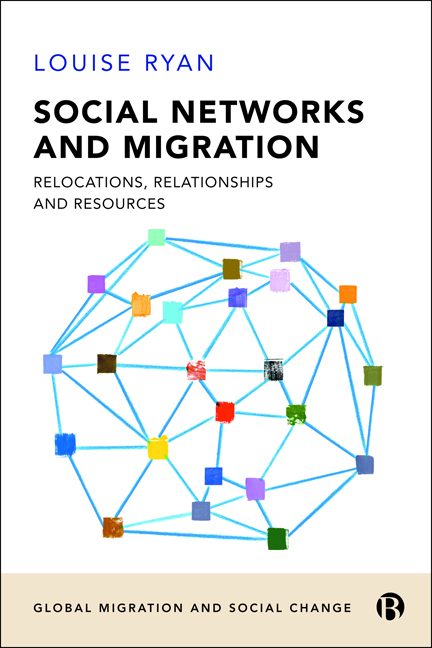Book contents
- Frontmatter
- Contents
- List of Figures
- About the Author
- Acknowledgements
- 1 Introduction: Embarking on a Book about Networks
- 2 Conceptualising Migrant Networks: Advancing the Field of Qualitative Social Network Analysis
- 3 Researching Migration and Networks: Empirical and Methodological Innovations
- 4 Social Networks and Stories of Arrival
- 5 Employment, Deskilling and Reskilling: Revisiting Strong and Weak Ties
- 6 Evolving Networks in Place over Time: A Life Course Lens
- 7 Transnational Ties: Narrating Relationality, Resources and Dynamics over Time
- 8 Conclusion: Thoughts and Future Directions
- Appendix
- Notes
- References
- Index
4 - Social Networks and Stories of Arrival
Published online by Cambridge University Press: 18 January 2024
- Frontmatter
- Contents
- List of Figures
- About the Author
- Acknowledgements
- 1 Introduction: Embarking on a Book about Networks
- 2 Conceptualising Migrant Networks: Advancing the Field of Qualitative Social Network Analysis
- 3 Researching Migration and Networks: Empirical and Methodological Innovations
- 4 Social Networks and Stories of Arrival
- 5 Employment, Deskilling and Reskilling: Revisiting Strong and Weak Ties
- 6 Evolving Networks in Place over Time: A Life Course Lens
- 7 Transnational Ties: Narrating Relationality, Resources and Dynamics over Time
- 8 Conclusion: Thoughts and Future Directions
- Appendix
- Notes
- References
- Index
Summary
Introduction
As Barry Wellman (1997) has noted, social network research can be polarised into quantification of social ties at one end of the spectrum and metaphorical descriptions at the other end. Similarly, in migration studies, research that, on the one hand, seeks to measure migrant networks, by counting ties, or, on the other hand, merely refers to the role of networks in some vague, metaphorical way, each risks simplifying complex and dynamic relationships. Indeed, merely describing the existence of ties tells us very little about how they may be implicated in migration decision-making processes. Hence, it may be misleading to simply infer causality between pre-existing network ties and migration (D’Angelo and Ryan, 2021).
Drawing on the framework of ‘telling network stories’, this chapter's primary aim is to contribute to deeper explorations and understandings of the multidimensional, messy and nuanced role of different relational ties in narratives of migration decision making and arrival in London. Following Borgatti et al (2009), I seek to analyse rather than merely describe social ties. Moreover, as discussed in Chapter 2, networks are a product of perception and cognitive processes (Krackhardt, 1987). Analysing network stories, I am interested in how participants perceive and present various social connections and narrate how these relationships may have shaped their migration projects.
In so doing, the chapter's second aim is to go beyond the merely ‘metaphorical’ use of networks within migration studies (Bilecen et al, 2018), to gain nuanced understandings not only of the meaning of relationships, but also the varied actors involved and the roles they play within network stories, as well as the sorts of resources that seem to be accessed and shared. My diverse participants present opportunities to analyse different arrival routes, including, for example, students, family migrants, intra-company transferees (ICTs), refugees and those directly recruited from abroad. Many, though not all, had pre-existing ties to friends or relatives in London. Using rich narratives, including thick descriptions, I explore how migration decision making can involve varied and even competing interpersonal relationships. Therefore, the chapter challenges simplistic assumptions about the apparent lure of strong ties, or the role of dyadic weak ties, as well as offering insights into negative ties and fleeting ties in migration processes.
- Type
- Chapter
- Information
- Social Networks and MigrationRelocations, Relationships and Resources, pp. 59 - 80Publisher: Bristol University PressPrint publication year: 2023



